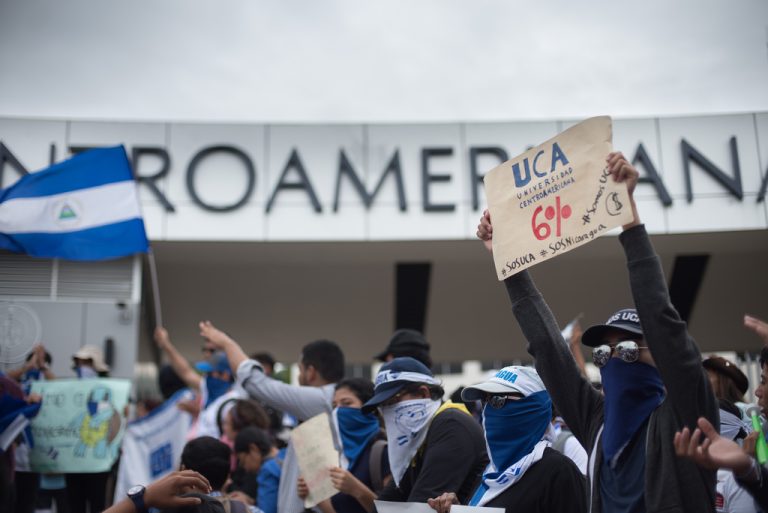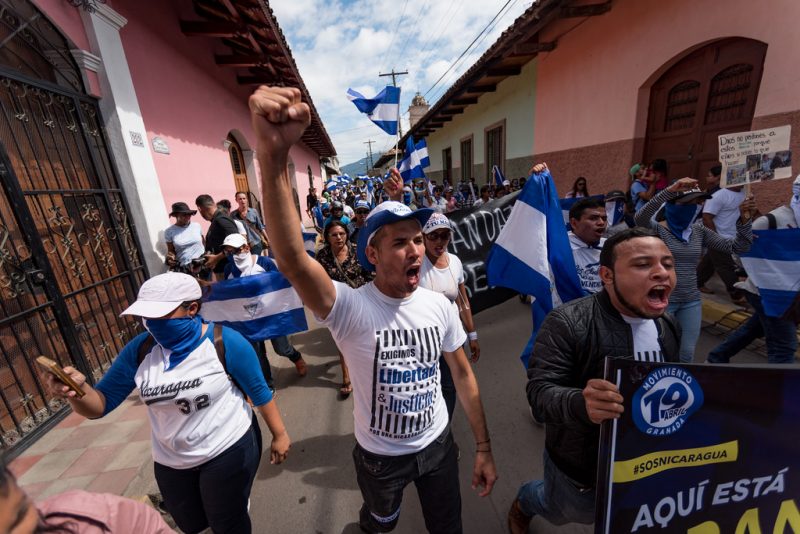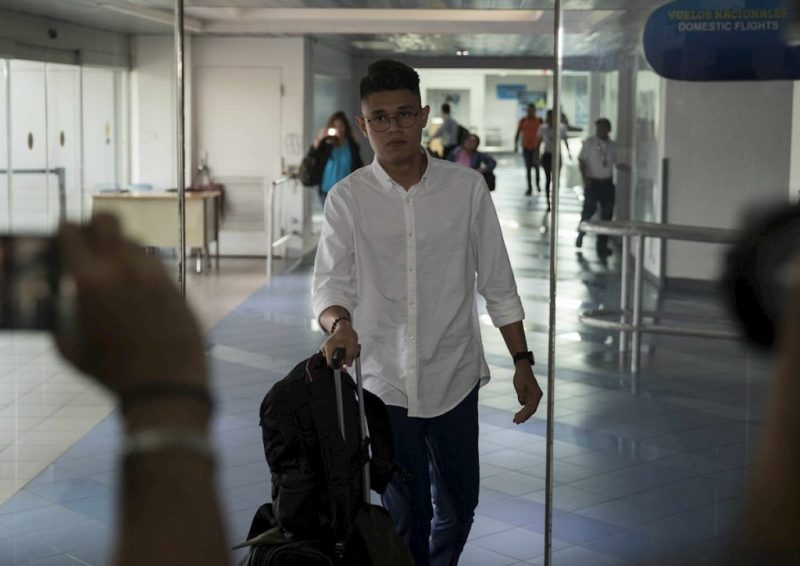11 de febrero 2020

Children of Exile: The Births “Sowing Hope” in the Camp of Nicaraguan Farmers

PUBLICIDAD 1M
PUBLICIDAD 4D
PUBLICIDAD 5D
The debate following Edwin Carcache’s resignation from the Civic Alliance: What’s the role and the real weight of the youth within the Civic Alliance

Edwin Carcache resigned from the Civic Alliance arguing that the youth and the university students “have been displaced”. “There’s an evident displacement"
The abrupt resignation of released political prisoner Edwin Carcache from his seat on the Civic Alliance’s executive council has generated a debate on the role of the university students within the opposition groups.
What’s the weight and the influence of the students and the youth in the political decisions being made by the Civic Alliance and the National Blue and White Unity (UNAB)? Do the student leaders maintain a connection with the current university halls? Where are the students that in April 2018 lit the torch of the civic revolution?
This past Saturday, February 8, Levis Rugama, also a released political prisoner and university leader, posted on Twitter that he would be giving himself “time for reflection and emotional healing from the Nicaraguan struggle”, and for that reason he’s leaving the “student movement and activism” in the UNAB.
Currently, there are four university movements inscribed with the Civic Alliance: the April 19th Student Movement; the April 19th University Movement; the Nicaraguan University Alliance; and the UNA (National Agrarian University) April 19th Movement.
Meanwhile, the University Coordinator for Democracy and Justice (UCDJ), which in turn brings together at least seven other student movements, forms part of the UNAB. There are also other independent student organizations that are in the process of creating “strategic alliances” with the movements allied with the Civic Alliance and the UNAB.
In response to all of the questions being raised, some of the leaders of these movements spoke with Confidencial to explain the role they play. All of those consulted shared the discomfort that Carcache expressed about feeling “displaced”. Each one gave different shading to this feeling, but there was an evident uneasiness about what they term “adultism”.

Edwin Carcache, university leader and former member of the Civic Alliance for Justice and Democracy. Photo: Carlos Herrera / Confidencial.
Carcache resigned from the Civic Alliance arguing that the youth and the university students “have been displaced”. “There’s an evident displacement. There are seven adults to one youth in the Alliance’s executive body. When they close ranks, they turn on you and displace you,” stated the released political prisoner.
Amaya Coppens, who now exercises a leadership role within the Articulation of Social Movements and not within a university organization per se, affirms that the youth and university student agenda has been left “a little relegated to one side.” She noted that the student muscle that was the motor force for the civic rebellion, in addition to being “dispersed”, has lost cadence before the new political context of the Civic Alliance and the UNAB.
“The student agenda, like the feminist agenda and the environmentalist one, have been left a little relegated to second place for everything that’s happening,” Coppens, also a released political prisoner, maintained. “It’s been a struggle to maintain these agendas as part of the political discussions. We students aren’t the only ones that have seen ourselves a little relegated. There’s some irritation, in this sense.”
Coppens said that the struggle against the Ortega-Murillo regime has become more “bureaucratic”, in contrast to the April social explosion in the streets. She stated that she felt more involved before in the decision making.

Student leader Amaya Coppens. Photo: Carlos Herrera
“I feel that now we’re in a different context, with people that have worked [politically] in some way for years, and in contrast, we haven’t. We try to influence them as best we can. We’re sitting at the same table, discussing. In some ways, it leaves us with a notable imbalance. I’ll try to continue, and I won’t resign, precisely in order to continue overseeing what’s happening and to try to get these agendas under discussion,” said Coppens.
Lesther Aleman of the Nicaraguan University Alliance, voiced similar complaints. He termed the fact that the youth aren’t always listened to, “a titanic struggle against a cultural practice”. “It’s fallen to us to deal with the internal generational dialogue. We want them to see us not only as youth that create fervor, but as political actors in the entire process,” he declared.
Yaritza Mairena Rostran, a member of the University Coordinator for Democracy and Justice (UCDJ), also reflected what Coppens and Aleman had expressed. However, she said that those university students in the UNAB have maintained a strong presence and have made their influence felt. “We believe that we’ve done a great job in the UNAB. Three of our members, including myself, were part of the former Political Council. We’ve participated in this entire process of national unity, together with the commissions and the team. We were participants in the conformation of the great National Coalition. We’ve developed a series of actions,” she asserted.
At the moment of speaking about the real weight that they have in the organizations, Aleman says that he feels “listened to” in the Civic Alliance, although he recognizes that they have to struggle more to obtain support for their proposals. “In the Civic Alliance, you have university movements with the right to a formal seat and a stand-in similar to the other sectors. That’s where the topic arises of our capacity to oversee the fulfillment of a proposal. For example, I present a proposal, but we’ve already spoken with other representatives, so that this proposal will be pushed through,” Aleman said. He also mentioned as an example of his influence, the fact that the political commission is presided over by Max Jerez, his peer.
Yaritza Mairena stated that being in the UNAB has been complicated for them, but that they’ve helped avoid the creation of “inner circles”. As a result, decisions must be made by everyone in the general assembly. While Coppens recognizes that the muscle they can flex as university students is now reduced in many cases to “personal” influence within the different spaces that they’re included in.
Some university leaders who stood out in the protests or were imprisoned have dropped out of the organizational spaces, be it for personal crises or because they’re in exile. One of them that was consulted for this article asked to remain anonymous but was conclusive in their response about the real weight of the university students in the Civic Alliance and the UNAB. “In synthesis, we have no weight anywhere,” the person asserted.

Lesther Aleman upon his return to Nicaragua from exile. Photo: Carlos Herrera
Aleman stated that many of his companions have abandoned “the struggle” out of “fatigue”. He explains their fatigue this way: “When they tell me that I’m controlled by COSEP or the MRS, that’s totally false. They put that into play, casting doubt on… the capacity for influence of the youth in Nicaragua. It falls on us to deal with the struggle, with the regime, and with that kind of accusations – that’s where you see that the young people begin to get tired,” he remarked.
The university students in the UNAB and the Civic Alliance recognized that their relationship to those currently in the university halls isn’t the best, although they continue maintaining contact. The young people attributed the deficit to the repression the regime has imposed.
“There are certain differences among the universities,” Coppens explained. “In the case of Leon, it’s a fairly particular situation for the level of violence out in the streets. There have been physical attacks within the university. They still maintain the so-called “defense groups” in the universities. That makes if very difficult for a person to develop relations with us, who they already know about,” she noted.
Aleman agreed with Coppens. “The regime hasn’t allowed us to have a presence all over the national territory.” However, Aleman assured that his movement has “developed strategic alliances with organizations in the outer territories. .. In the municipalities, departments, neighborhoods and with movements created in these places.
“In addition, [we have alliances] with structures that have been created within the universities. Strategic alliances for full-time work: resistance, formation of leaders; construction of youth proposals; general propositions, like the struggle for the political prisoners,” he noted.
Yaritza Mairena stated that the CUJD prioritizes the organizational work in the territories. She stated that they had eights movements working in cities like Esteli, Leon, Matagalpa and Carazo, coordinating actions of civic protests, like graffiti against the regime, and organizational meetings.
Amaya Coppens maintains that the student and youth movement “are disperse”, but said that she knew of actions on the part of the CUDJ to unite the university students and youth once more into one body. Aleman felt that the work should be “done simultaneously”.
“We don’t all have to think the same way. I speak expressly of the word ‘similarity”, that isn’t the same as ‘uniformity’. In this case, I can tell you that we are in an ever-stronger effort to construct a greater network of strategic alliances with the movements, to flex one unique muscle,” Aleman stated.
“Here, we’re not competing to have only one logo exist; each one has the autonomy of their organization and points of view in analyzing what’s what in Nicaragua. We’re diverse, but there’s an inclusive character, a united character, a character of simultaneous work, shoulder to shoulder, that can give hope to this country that the youth are organized and that we’re strengthening ourselves ever more. Because the biggest challenge for all of the youth structure is to get ever stronger.”
Archivado como:
PUBLICIDAD 3M
Periodista. Destaca en cobertura a violaciones de derechos humanos: desplazamiento forzado, tráfico ilegal en territorios indígenas, medio ambiente, conflictos mineros y ejecuciones extrajudiciales. Premio Iberoamericano Rey de España 2018.
PUBLICIDAD 3D